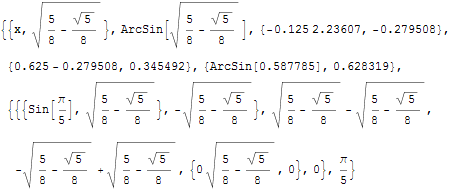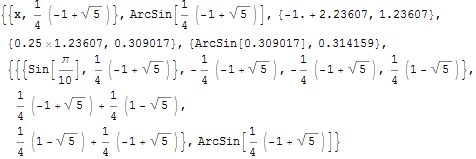This is a continuation of: Why do certain fractional values in TriangleWave not evaluate?
The analysis by R.M and rasher revealed that problem to reduce to the behavior of:
ArcSin[Sin[π / 10]]
ArcSin[1/4 (-1 + Sqrt[5])]
Every other denominator besides ten, at least up to 500,000, automatically evaluates to a simpler form:
Position[ArcSin[Sin[π / Range[500000]]], _ArcSin] (* slow *)
{{10}}
All other coefficient of π with a denominator of ten appear to exhibit the same problem:
ArcSin[Sin[{1, 3, 7, 9, 11} π/10]]
{ArcSin[1/4 (-1 + Sqrt[5])], ArcSin[1/4 (1 + Sqrt[5])], ArcSin[1/4 (1 + Sqrt[5])], ArcSin[1/4 (-1 + Sqrt[5])], ArcSin[1/4 (1 - Sqrt[5])]}
FullSimplify reduces the expression:
ArcSin[Sin[{1, 3, 7, 9, 11} π/10]] // FullSimplify
{π/10, (3 π)/10, (3 π)/10, π/10, -(π/10)}
Is this a bug? Is there some explanation for it?
Before someone points out the obvious: I see that Sin[π/10] evaluates to 1/4 (-1 + Sqrt[5]). But why isn't ArcSin "smart" enough to recognize this value, when it recognizes others? For example Sin[π/12] evaluates to (-1 + Sqrt[3])/(2 Sqrt[2]) but ArcSin correctly recognizes this and outputs π/12.



ArcSinReadProtectedif removing it does not show additional information? :( $\endgroup$Sin[Pi/8]does not evaluate, if expanded toSqrt[2 - Sqrt[2]]/2], by hand or withSimplify`TrigToRadicals,ArcSin[Sqrt[2 - Sqrt[2]]/2]does not evaluate back toPi/8, unlessFullSimplifyis applied. This seems to have a different issue thanPi/10, in thatPi/8is never guessed at, if we applyTraceas in Simon Wood's answer. (Of course, without replacingSin[Pi/8],ArcSin[Sin[Pi/8]]yieldsPi/8.) $\endgroup$